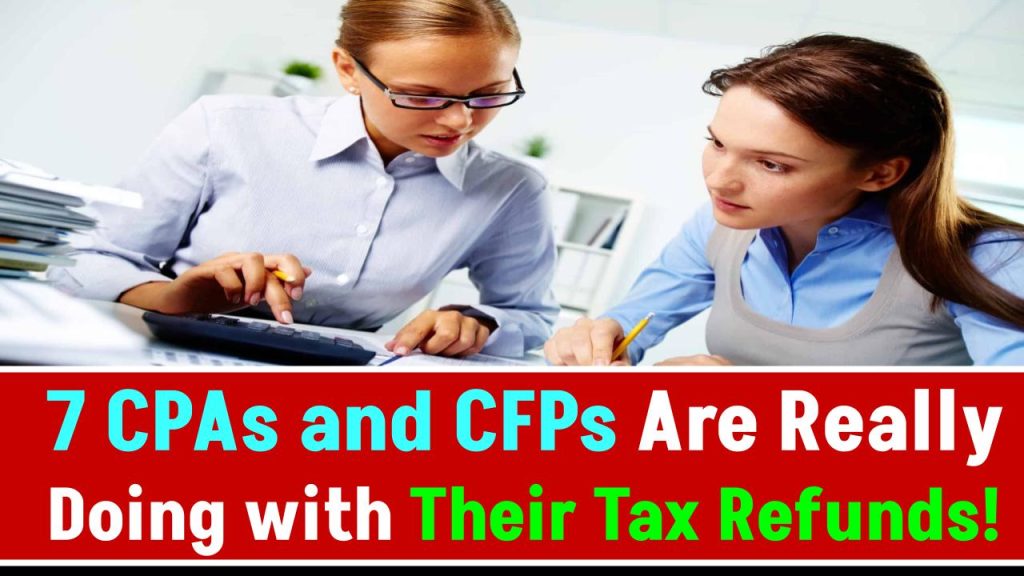
Tax season is here, and for many Americans, that means receiving a tax refund. But while some people may rush to spend their refunds on vacations, shopping sprees, or the latest gadgets, financial professionals like Certified Public Accountants (CPAs) and Certified Financial Planners (CFPs) take a more strategic approach.
CPAs and CFPs understand that a tax refund isn’t “free money”—it’s simply the return of overpaid taxes. Instead of treating it as extra cash, they use their refunds to build wealth, secure their financial future, and eliminate financial stress.
So, what exactly are these money experts doing with their tax refunds? More importantly, should you follow their lead? Let’s break it down.
What 7 CPAs and CFPs
| Strategy | Why It’s Smart | Key Benefit |
|---|---|---|
| Replenishing Emergency Funds | Ensures financial security for unexpected expenses | Peace of mind |
| Paying Down High-Interest Debt | Saves money on interest and improves credit score | Less debt, more financial freedom |
| Contributing to Retirement Accounts | Maximizes tax-advantaged growth | Bigger retirement savings |
| Investing in Tax-Efficient Vehicles | Helps minimize taxes on investment gains | More money stays in your pocket |
| Funding Education Savings Plans | Prepares for future college expenses | Less student loan debt |
| Making Charitable Contributions | Supports good causes while getting a tax deduction | Feel good and reduce taxable income |
| Enhancing Professional Development | Boosts career growth and earning potential | Higher income over time |
Pro Tip: Not sure how to best use your tax refund? Consider combining multiple strategies to get the most out of it!
CPAs and CFPs use their tax refunds wisely, focusing on financial security, debt reduction, retirement savings, and wealth-building. Instead of spending your refund on short-term wants, consider applying these expert strategies to secure a brighter financial future.
What will YOU do with your tax refund this year? Let us know in the comments!
What 7 CPAs and CFPs: Replenishing Emergency Funds
What it means: Financial experts always stress the importance of having an emergency fund. This is a savings cushion designed to cover unexpected expenses like medical bills, car repairs, or sudden job loss.
Why CPAs and CFPs do it:
Jen Grant, a CFP at Perryman Financial Advisory, says she always puts part of her tax refund into her emergency fund. “An emergency fund is your financial safety net,” she explains. “It keeps you from going into debt when life throws you a curveball.”
How you can do it:
- Aim for 3–6 months’ worth of expenses in your emergency fund.
- Keep it in a high-yield savings account for easy access and some interest growth.
What 7 CPAs and CFPs: Paying Down High-Interest Debt
What it means: High-interest debt—like credit card balances or payday loans—can quickly spiral out of control due to compounding interest.
Why CPAs and CFPs do it:
Financial advisors prioritize paying down credit cards, personal loans, and other high-interest debts first because the longer you carry a balance, the more money you lose in interest.
Example:
- Suppose you have a $5,000 credit card balance at 20% interest.
- If you only make minimum payments, you could end up paying over $10,000 total before it’s fully paid off.
- Using your tax refund to wipe out a chunk of that debt saves you hundreds or even thousands in interest.
How you can do it:
- Pay off high-interest credit cards first (known as the avalanche method).
- If you have multiple debts, consider the snowball method—pay off smaller debts first for psychological wins.
Also Check: School Holidays Extended in Uttar Pradesh: Schools to Remain Closed from February 17 to 20
What 7 CPAs and CFPs: Contributing to Retirement Accounts
What it means: Putting money into tax-advantaged retirement accounts like a 401(k), Roth IRA, or Traditional IRA helps you save for the future while reducing taxable income.
Why CPAs and CFPs do it:
- Roth IRA contributions grow tax-free and can be withdrawn tax-free in retirement.
- 401(k) contributions may come with employer matching, which is essentially “free money” for your future.
Example:
- If you invest $3,000 of your tax refund in an IRA with a 7% annual return, it could grow to $22,000 in 30 years—all from a single deposit!
How you can do it:
- If your employer offers 401(k) matching, contribute at least enough to get the full match.
- If you’re under the Roth IRA income limit ($146,000 for single filers in 2024), consider maxing out a Roth IRA ($7,000 limit in 2024).
What 7 CPAs and CFPs: Investing in Tax-Efficient Vehicles
What it means: Smart investors use their tax refunds to buy index funds, ETFs, or municipal bonds—investments that grow wealth with minimal tax impact.
Why CPAs and CFPs do it:
- Index funds have low fees and grow steadily over time.
- Municipal bonds offer tax-free interest income, making them ideal for high earners.
Example:
- Investing $2,000 in an S&P 500 index fund with a 10% average return could grow to $35,000 in 30 years.
How you can do it:
- Open a brokerage account and invest in diversified, low-cost ETFs or index funds.
- Speak with a financial planner to find tax-efficient investment options.
Also Check: Bijli Bill Mafi Yojana 2025! Electricity Bills Waived for THESE Families – Are You Eligible?
What 7 CPAs and CFPs: Funding Education Savings Plans
What it means: 529 college savings plans allow you to invest money tax-free for a child’s future education expenses.
Why CPAs and CFPs do it:
- The money grows tax-free.
- Some states offer tax deductions for contributions.
Example:
- If you save $5,000 per year in a 529 plan starting when your child is born, with a 6% return, they’ll have over $150,000 for college by age 18!
How you can do it:
- Open a 529 plan in your state to see if you qualify for tax benefits.
What 7 CPAs and CFPs: Making Charitable Contributions
What it means: Donating to qualified charities not only supports good causes but can also reduce your taxable income.
Why CPAs and CFPs do it:
- Donations to 501(c)(3) organizations are tax-deductible.
- Helps lower your taxable income if you itemize deductions.
How you can do it:
- Check the IRS’s list of tax-exempt charities before donating.
- Keep receipts for tax deduction purposes.
What 7 CPAs and CFPs: Enhancing Professional Development
What it means: Using your tax refund to pay for a certification, online course, or conference can boost your skills and earning potential.
Why CPAs and CFPs do it:
- Investing in education and training can lead to higher salaries and job promotions.
How you can do it:
- Consider courses on Coursera, Udemy, or LinkedIn Learning.
- Attend industry conferences or get a professional certification.
What 7 CPAs and CFPs (FAQs)
Should I invest my entire tax refund?
Not necessarily! It depends on your financial situation. If you have high-interest debt, pay that off first before investing.
Is it better to save or invest my refund?
If you don’t have an emergency fund, save first. If you do, investing can grow your wealth faster over time.
How do I know the best way to use my tax refund?
Start with your financial goals:
Need security? Build savings.
Have debt? Pay it off.
Want to grow wealth? Invest it.









